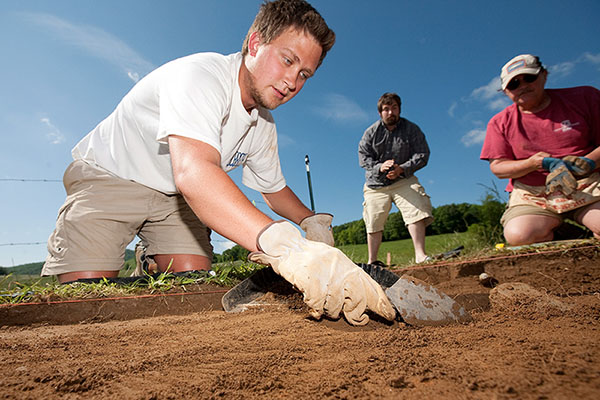Carefully digging, scraping and sifting. It's how archeologists seek clues into human history. Students at Appalachian State University learn these skills—and find cool artifacts—in a field archeology course each summer.
Transcript
Tootsie Jablonski: This is archeological field school. Pretty much, we're just learning how to do archeology. It's a first-time experience for most of us. I love it. It's so much fun. It's everything that I had expected when I picked this major. You get to dig in the dirt all day. You get to go home feeling like you've done something.
Jeffrey Jones: We found a couple of points, a couple of scrapers, and a good amount of pottery. It's not a very significant site, but we're learning how to dig arbitrary levels and how to do test bits and, as Dr. Whyte says, "it's not what you find, it's what you find out."
Dr. Tom Whyte: This is a second terrace—an old flood plain overlooking the headwaters of the South Fork of the New River where it conflows with Dutch Creek in Ashe County. Not much is known about this area. We need to know what people were doing here in the past and when, what people's lives were like throughout pre-history in this area. This is a perfect setting for teaching—for teaching my students how to observe soil changes, to recover artifacts, to think about the human past, to sculpt the earth, to map and measure and use the tools of archeology. We're finding mostly prehistoric artifacts—artifacts that were left by native Americans before the whites came to the mountains here and we're finding artifacts from different time periods. We have found things that we think might be 12,000 years old, which would put the site into the late ice age.
TJ: This is a Morrow Mountain point. Once they made a stone tool, they would frequently re-sharpen it so they wouldn't have to find new lithic materials. Something that could have started out inches bigger would have constantly been chipped away and chipped away. It's made out of local quartz and would be about 7,500 years old. It was the most exciting thing of my life at that point. I ran over to Dr. Whyte and I washed it off. He told me what it was and I put on my Facebook status that I had found something cool. In class we study all of the different types of points and the different lithic materials used, but when you actually come out here and take it out of the ground and look at it... it makes everything more real and it makes it a lot easier to remember. We really do have one of the best Anthropology departments, period. We have some amazing professors that have really changed Southeastern archeology. To get to be with them, in their classes, to learn from them—it's a really great experience.
JJ: It's been really great working with Dr. Whyte. He's very knowledgeable. He's enthusiastic, helpful and friendly.
TJ: It's exciting to think that maybe one day I'll have a specialty and be able to do something like he's doing. What job could be better than getting to play in the dirt all day. Right?
What do you think?
Share your feedback on this story.












